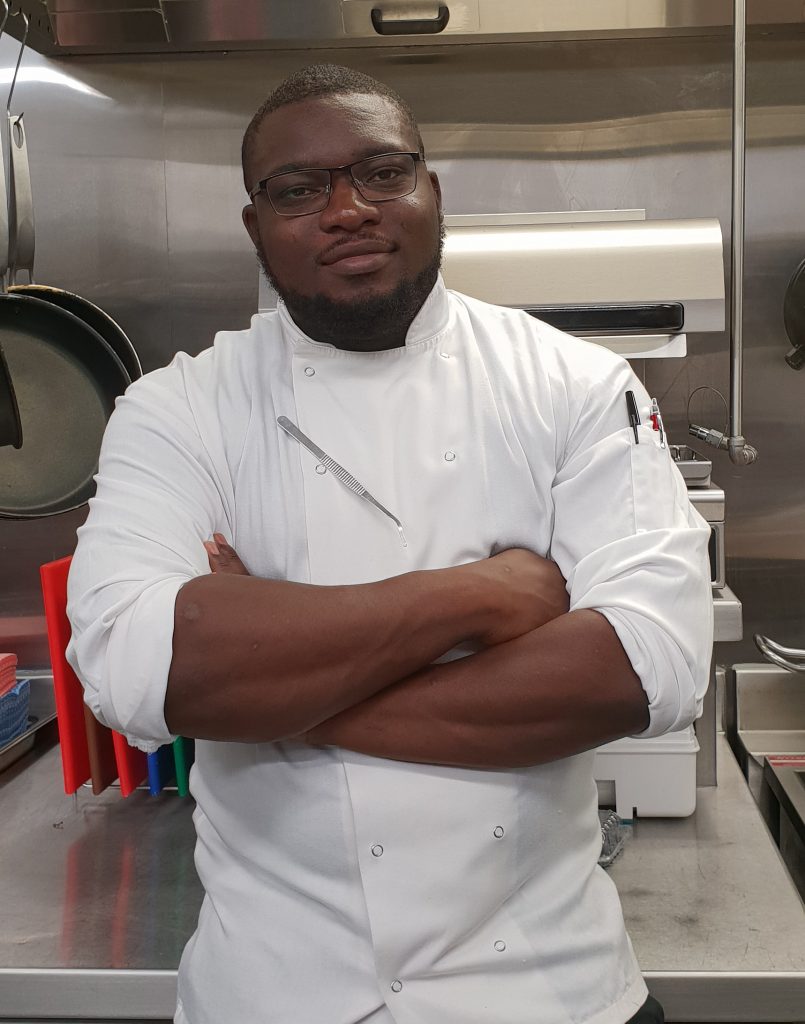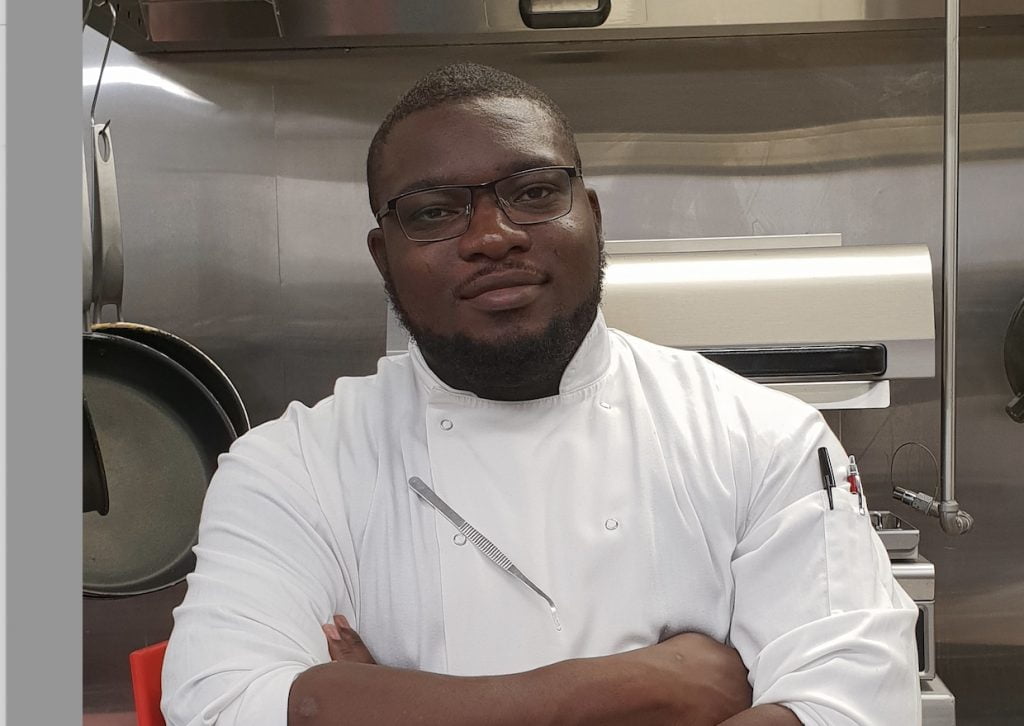Community Spotlight – Babatunde Abifarin, founder of Farin Road Restaurant
Babatunde Abifarin is founder and head chef of Farin Road restaurant in Edinburgh, and has worked in the trade for the better part of a decade. Abi has always been eager to introduce the Scottish community to African food, by adding African ingredients to many of his menus at restaurants where he has worked as head chef. Aside from being head chef at Farin Road, Tunde is also the host of Fusion Supperclub, a unique opportunity to experience African cuisine in a creative and innovative way.
Babatunde recently won the Chef of the Year award at the inaugural BIH Spotlight Awards.
Tell me a bit of yourself…
I am a chef in Edinburgh, working here for close to ten years now. I’ve done a bit of everything cooking wise, from your high end to pub food, Chinese takeaways, pizzas. I’ve covered my base as much as I can. I started ten years ago, meaning it to be more of a college job which I got through a friend. From my very first experience I loved it and decided to leave my design career to focus on cooking. It’s been an eye opener, it’s been fun, it’s been challenging definitely though.
What have been the biggest challenges so far?
It’s the industry as a whole. One of the biggest one I realised, a couple of years ago when the whole Brexit conversation was going on. The government published an article or document where chef’s were not regarded as highly skilled labour. For me that was quite annoying. I mean, no offence to a receptionist or secretary, but you can get anybody to work in a clerical position. But it takes years to actually know how to cook, that requires skill. I found that quite challenging because the industry doesn’t regard chefs as valuable.
But I mean, thank God for the lockdown! As much as the lock down has had its positives and negatives I think it has really shown what value the whole hospitality industry brings in, particularly chefs. When I say chef’s I don’t just mean your restaurant or hotel chef’s. Whether that’s production for a manufacturing company or a chef that does catering or takeaways. For me they are all chefs and are all very very important in terms of what they bring to the industry as a whole. So, the lockdown gave me a new perspective in terms of what can be done from my own point of view to improve myself, see where the loopholes are in the industry and for me to capitalise on them.
Do you feel that lockdown has helped in some ways then?
Oh yeah. I think that lockdown has been a massive eye opener. Chef’s right now are getting paid way more than before lockdown. Because of the lockdown, so many people have left the industry and it weeded out the good from the bad, in a way. For me as a foodie, I think that’s quite important. Before lockdown, anybody with money could buy a place on the high street and open up a restaurant whether you’re selling good food or not.
Now we live in a more of a dine out or take away culture, people don’t cook at home anymore. I actually wrote my dissertation for my masters on the death of home cooking. Growing up, our parents taught us how to cook and only had that culture of getting take-out every now and then. But now, that is the culture we live in thanks to the delivery apps. The lockdown showed us who is who in terms of the industry, and weeded out the people who really don’t know how to cook or manage their businesses. That gave way to somebody like me who thinks, I might not have the money but I have been able to learn enough in the industry and have the cooking skills to think, let me put my foot in the door and let me see where I can go from there.
Do you think that change in takeaway culture has changed the industry and what food is being made?
I think that takeaway culture increased due to lockdown because at that point most people were working from home, which then means people tend to be more relaxed. Yes, we went through the stage where people were trying to make bread and that kind of thing. But with takeaway as a whole, there were more people buying or taking away food than actually cooking from home. Then post lockdown, we had the influx from the Eat Out To Help Out scheme from the government, which then pushed so many people to go out to eat. Since then, especially in Edinburgh, there’s been more restaurants opening after lockdown than ever! That’s because there’s a big gap in the market because there’s people that want to go out, hence more restaurants opening up every single day in Edinburgh.
With staff shortage- there were so many factors. Chefs were not being valued before lockdown. But those of us that decided to stick to it and wait it out post lockdown, we see the value. But it’s a catch 22. Now, you’re getting paid for what you think you’re truly worth, but you don’t have enough staff to help you do your job, so you tend to be doing way more than you were before. Brexit also didn’t help, because the ‘low skilled’, as they say, decided to leave the country or change careers, and that created a big black hole in the hospitality industry. There’s still lots of pressure, but as a business owner, chef or restaurateur, you then have to evaluate your menu to match what kind of staff you can get. There’s no point doing a 20 item or set menu if you don’t have chefs.

What do you enjoy the most about working in food?
The pressure. If my wife was here, I would deny that! There’s something about how you go into work Friday night and you have 200 booked and you get in this zone. You’re cooking food and it’s just go go go. I don’t want to say it’s like being in the military, but it’s quite close. It is that push to produce things at a high level whilst still being under pressure. I think it can be addictive sometimes. I have been in the kitchen on a Friday night and we have 20 booked, and I feel more tired than if I do 200. You become more complacent. But when you have 200, your eyes are wide awake and your brain is sharp. I’m always looking forward to Friday and Saturday nights.
So a bit of an adrenaline junkie?
Oh yeah, oh yeah.
Can you name one of your proudest moments whilst working in the industry?
That will be an easy one. There was a place where I was head chef. Obviously, in most places you have your a la carte menu and you have your set menu. When I was there, normally the menu used to come down from the head office. I was the first head chef in the company to actually be given the chance to write his own menu. Which was great! The menu was going great, so we decided to start doing our set menu. I thought, based on how I have been trained and gone through the industry, I always go home and think of dishes and write up recipes.
So I called the chefs I worked with and I said I am not going to write the set menu. It’s your job to give me set menus and they’re going to be on a rotational basis. Every week, I wanted a menu based on anything that influenced them, whether it’s food from their country or places they had gone to eat. But they had to write a menu based on what we had in the kitchen.
That teaches them how to be creative, to work within a budget and food costing which is very important. I remember there was a girl who had a really good menu, it was simple and straightforward. We started her menu on Tuesday, and the first check that came in for service, she was like ‘chef, chef, chef somebody ordered my food!’. It was the look on her face, that someone had decided to leave the a la carte menu. By Thursday, people ordered way more from her menu than from the a la carte menu. I remember she came to me and said ‘my menu’s better than yours’! It was honestly so amazing.
For her it was really great because she put so much work into the menu, the costing and taste profiles. So by the time that week was finished, she already had ideas for when it was her next turn. It was amazing for everybody, because they just wanted to get things out there. By the weekend she had all of her friends coming to try her food, it was amazing.
Where do you see yourself in ten years?
I am a bit of a dreamer. Which I believe is always good because it’s good to set goals for yourself, whether they are realistic or not- it’s something that you’re chasing. I’m not a big fan of just having a 9-5 and cashing in the pay cheque at the end of the month without having something to achieve. In this day and age, there’s so much that an employer can do for you in this industry. As much as you might have a 9-5 job, what are you doing on the side to create something for yourself? Are you looking to open your own restaurant?
For me in ten years, I would say it’s to have a place I can call my own. 30-40 cover max. I’m not really looking to have a chain of restaurants, more of having something nice and cosy that you can depend on. That does good food, and that can be a legacy that I leave behind for my kids. I’d be very satisfied with that.
The future of hospitality is…
Very bright. Very bright. Mainly because of two things. I think the lockdown has shown what potential the hospitality industry has in terms of how much revenue it brings and contributes to the economy. Also, it shows the lack of in house talent we actually breed, and how most chefs don’t value the British hospitality industry.
I can only use Edinburgh as an example. We’ve got so many amazing restaurants in and around Edinburgh and Scotland, but what I realise is that most of these chefs learn in these fine dining restaurants, and then they leave to go to London or France or other places. Which then leaves a hole in Scotland, because Scotland is not a massive market. In the UK, not many schools offer catering courses to the level at which it’s competitive with, let’s say, France or Switzerland. In recent years I’ve seen more chefs opening up cooking schools, which is really going to drive the industry. So based on that alone, I think the future is bright!
There’s so much more to hospitality than your hotels and restaurants. There is so much. As much as I’m a chef and I do Farin Road, I still do manufacturing as well. I do my own line of chilli sauces that I do. When I went into production and manufacturing, for me it’s a totally different aspect of catering or food production that as a chef you wouldn’t even think there is. There’s so many options. I really think the opportunities are there.
M
Read more interviews here.

